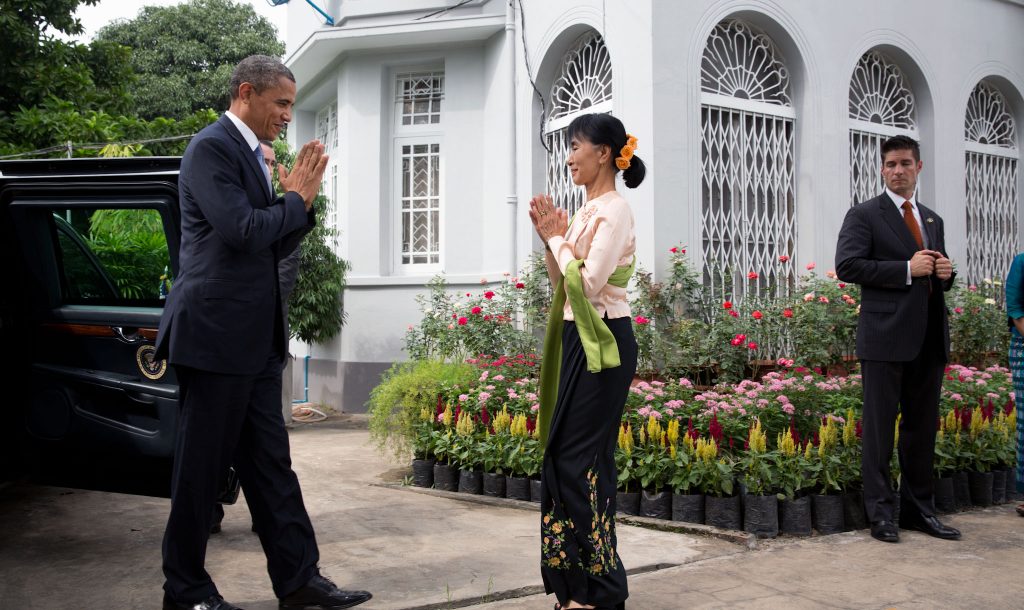Moves by the Obama administration to soften sanctions and reward Myanmar’s progress to democracy, while welcome, are not enough to meet the country’s economic growth needs, giving China a strategic advantage, Monish Tourangbam and Pawan Amin write.
Myanmar’s democratic transition and the consequent dynamics between Naypyitaw and Washington have commanded strategic priority for America’s Asia policy.
China’s long years of influence in Myanmar and the latter’s new overtures to diversify its relationships lend geostrategic significance to US-Myanmar ties. As the Obama years come to a close, and the White House prepares for its new President, how the US-Myanmar relationship pans out will be of interest to America’s strategic competitors and partners alike.
On 14 September, during Myanmar State Counsellor Aung San Suu Kyi’s official visit to the US, President Obama returned Myanmar to the status of a “least-developed beneficiary developing country.” This allows the US to restore trade benefits by reinstating preferential treatment to Myanmar under the Generalised System of Preferences program.
Calling Myanmar’s transition “remarkable”, President Obama scrapped those sanctions that could be lifted without congressional authorisation in order to reward the Southeast Asian nation for the progress made so far.
However, Asia World is one of Myanmar’s biggest conglomerates and similar sanctions on other businessmen have made it difficult for foreign investors to enter Myanmar’s market by restricting options for local partners in potential joint ventures. This indicates that despite its commitment to help Myanmar progress economically and sustain its democracy, the US is still treading cautiously as it goes about normalising its relations with the country.
President Obama faces domestic opposition in the US Congress from those who think persisting concerns regarding military involvement in dubious business operations warrant continued sanctions. Suu Kyi’s own policy on human rights violations against the Rohingyas has been a subject of extensive debate for some time.
While the Obama administration can take credit for defrosting ties with Myanmar’s military establishment, it is believed that the US Congress is in the driver’s seat in US-Myanmar relations, especially after the Republican Party’s 2014 congressional election victories. This has been highlighted by the steep budgetary cuts in military training to Myanmar and the reporting requirements the National Defense Authorization Act imposes on the Department of Defense for all military training or consultation offered to the Tatmadaw (Myanmar’s military).
This situationcould create more scope for China to increase its influence in the country through enhanced military relations. China has over the years also injected itself as a power broker in Myanmar by supporting strong minority rebel groups like the United Wa State Army, something that a distant power like the US cannot manage.
China became an important economic partner for Myanmar during its period of international isolation under the military government. With its recent democratic transition it was believed that increasing investments from the West would help Myanmar reduce its economic dependence on China. So far, however, investments from the US and elsewhere in the West have been unable to match those from China.
The new National League for Democracy (NLD) government finds itself forced to assure Beijing of the safety of its key investment projects as Myanmar strengthens ties with the US. Key among these is the Myitsone Dam project, over which Beijing is increasingly applying pressure for a speedy resolution. However, the NLD, which has also recently started the 21st Century Panglong Peace Conference to unite Myanmar’s different ethnic groups, is sensitive to the hostilities which are likely to break out with the Kachins should the Myitsone project go ahead as it is expected to submerge several villages in the Kachin area.
Thus, national security also becomes a driving force behind the need for Myanmar to develop new partners as a way of ensuring its economic growth.
On that front, the US will have an important role to play in making it viable for investors to venture into what has been called Asia’s last frontier economy. To this end the joint statement between President Obama and State Counsellor Suu Kyi inspires confidence by announcing that the US-Myanmar Partnership will be anchored on annual cross-sectoral dialogue between the US Department of State and Myanmar’s Ministry of Foreign Affairs.
However, when asked when the sanctions will be lifted in entirety, the only timeframe offered by President Obama was “soon”. The question facing Myanmar’s economy, is will that be soon enough?
Monish Tourangbam is Assistant Professor at the Department of Geopolitics and International Relations, Manipal University (Karnataka).
Pawan Amin is a research scholar at the Chinese Studies Programme, Centre for East Asian Studies, School of International Studies, JNU (New Delhi).
This article is published in collaboration with Policy Forum — Asia and the Pacific’s premier website for policy analysis and debate.
 Facebook
Facebook  Twitter
Twitter  Soundcloud
Soundcloud  Youtube
Youtube  Rss
Rss 